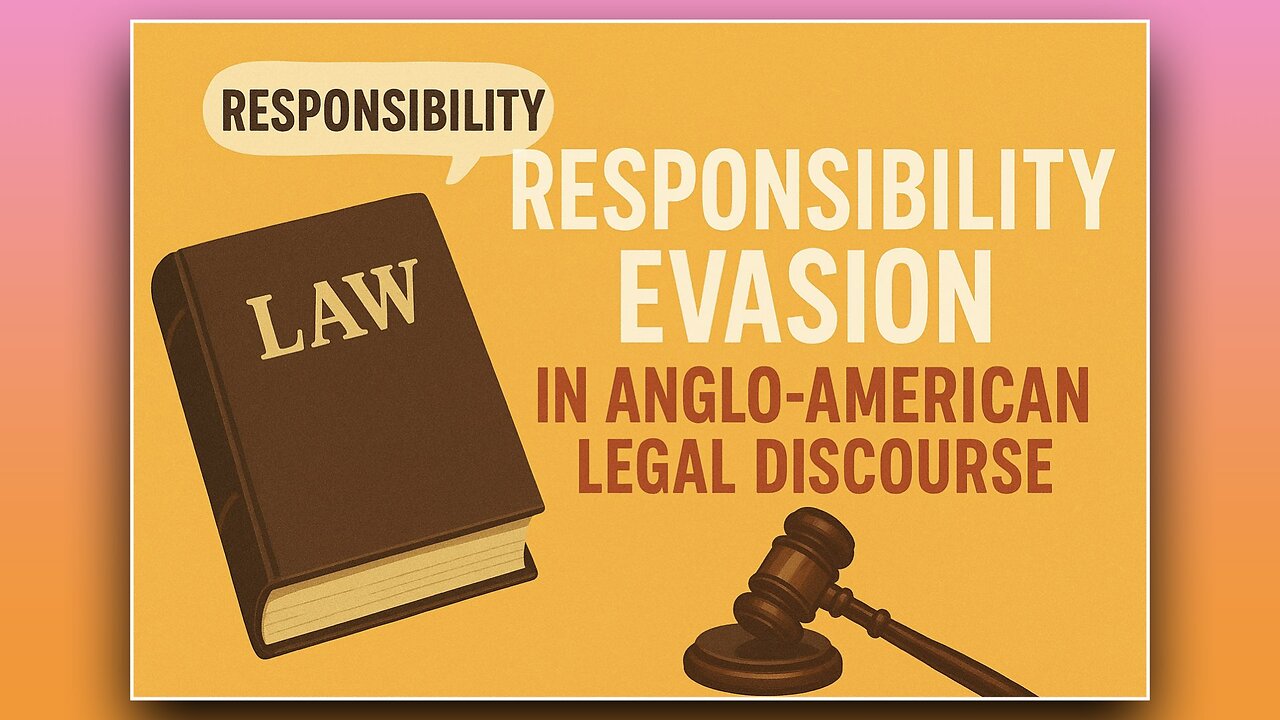Premium Only Content

How Anglo-American Law Evades Responsibility - A Chinese Perspective
This episode explores how legal language in Anglo-American law avoids naming responsibility. Drawing on Wei Yongqian’s 2025 study, we’ll uncover how 名词化 (míngcí huà, nominalization)—the #grammatical shift from actions to abstract nouns—allows legal texts to obscure agency, enhance authority, and institutionalize law. From the U.S. #Constitution to the U.K. #Human Rights Act, we’ll see how words like regulation, liability, responsibility, and fairness package law as neutral, objective, and unquestionable—while subtly evading accountability. With insights from Foucault and comparative reflections on corporate law, #AI #governance, and human rights, this podcast asks: What does it mean when the very language of law hides responsibility?
Time Codes
00:00 - Nominalisation
01:29 - What is Nominalization (名词化 míngcí huà)?
02:55 - Foucault (福柯 Fú kē) and the Disappearance of Actors
03:57 - Findings: The Words that Disguise Responsibility
05:16 - Western Law in Practice: Corporate and AI Responsibility
06:17 - Why It Matters: Implications for Law in the West
07:32 - Toward #Linguistic Awareness in #Law
名词化 (míngcí huà) — #Nominalization
语法隐喻 (yǔfǎ yǐnyù) — Grammatical Metaphor
责任 (zérèn) — #Responsibility
责任规避 (zérèn guībì) — Responsibility Evasion
去行为者化 (qù xíngwéi zhě huà) — De-agentization
法律话语 (fǎlǜ huàyǔ) — #Legal Discourse
合法性 (héfǎ xìng) — Legality
公平性 (gōngpíng xìng) — Fairness
福柯 (Fú kē) — #Foucault
制度化 (zhìdù huà) — #Institutionalization
-
 DVR
DVR
Nikko Ortiz
1 hour agoAI Is Just SCARY Now... | Rumble Live
8.96K -
 LIVE
LIVE
The Mel K Show
2 hours agoMORNINGS WITH MEL K - Flipping the Global Chessboard Exposes Decades of Deception - 10-20-25
630 watching -
 LIVE
LIVE
The Shannon Joy Show
1 hour agoALERT: Texas To Implement UK Style Digital ID, Mike Lee Leads National Charge! Live W/ Maria Zeee
207 watching -
 LIVE
LIVE
LFA TV
15 hours agoLIVE & BREAKING NEWS! | MONDAY 10/20/25
3,994 watching -
 LIVE
LIVE
Trumpet Daily
1 hour agoTrumpet Daily LIVE | Oct. 20, 2025
392 watching -
 37:24
37:24
Tudor Dixon
2 hours agoHow Democrat Rule Destroyed California & How Republicans Can Take It Back | The Tudor Dixon Podcast
1.31K1 -
 1:01:27
1:01:27
VINCE
3 hours agoThe Right Made Him President, The Left Made Him King | Episode 150 - 10/20/25
161K116 -
 2:00:43
2:00:43
Badlands Media
7 hours agoBadlands Daily: October 20, 2025
32.2K12 -
 1:40:42
1:40:42
Caleb Hammer
15 hours agoMost Insane Car Debt I’ve Ever Seen | Financial Audit
14K1 -
 1:11:47
1:11:47
The Big Mig™
3 hours agoConfirmed, Adam Schiff Plotted Against Trump
27K6